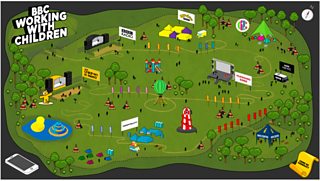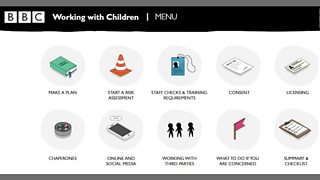A new way of learning to work with children
Catherine Chambers
Senior editorial producer, BBC Academy

The BBC Academy's new Working with Children course breaks the mould of traditional e-learning. Scripted by Jon Hunter (The News Quiz, Mock the Week) with characters designed by comedian Henry Paker (Radio 4), it features a penguin, a Brummie dog and a pigeon. No cats though - the budget didn’t stretch to that.
When the existing course was due to be updated after three years we decided to take the opportunity to try out a new learning design approach with the aim of creating a more memorable experience.
The object of the Working with Children course is to safeguard and protect any children that come into contact with BBC, whether as audience members, guests or contributors. Our core learning outcome is to empower BBC staff to confidently apply the ten ‘golden rules’ of child safety (the BBC Code of Conduct) when working with children.
Our challenge as learning designers was to work with BBC experts on the subject to create training that was highly memorable and would deliver successful learning outcomes.

Our priority was to communicate the ‘golden rules’ in a way that learners would retain and remember. This meant that a significant part of the course needed to be based around scenarios that staff might find themselves faced with. We thought carefully about how we could present the scenarios in a way that learners would be able to recall easily.
We chose a game approach because it’s more immersive and engaging than traditional e-learning using text and video. Our brains aren’t hard drives and can’t just recall huge swathes of information. But we do learn from experience.
With this in mind, we decided to depart from the traditional ‘data dump’ approach and focus instead on creating a short, fun and visually engaging experience that people would remember and be able to apply in their day to day jobs.
We did this using the ‘experience, reflect, act’ model (Kolb,1984) which is based on learning from experience, reflecting on the experience and applying the learning in a new situation.
This is the essence of scenario-based, or experiential learning with feedback to support reflection and drive behavioural change. To be effective, the feedback needs to relate directly to the learning outcomes. For our course, this meant that each scenario was followed by the relevant Code of Conduct statement to reinforce the learning.

We wanted to inspire staff with a creative concept and an emphasis on narrative storytelling and interactivity to support knowledge retention. The training we designed does just that. There's an interactive BBC festival map (second picture above) consisting of various festival zones (BBC Radio, CBeebies, Children in Need, Vloggers, Hospitality) featuring ‘what would you do’ scenarios that staff might face when working with children. The final zone, an ‘information point’ (above), provides practical guidance in the form of an infographic with key information along with links and a downloadable version of the BBC Safeguarding Children policy.
This is a serious topic but we used light humour in the scenarios to engage our learners with the subject and ensure the learning outcomes were met. We used animation as this would allow more flexibility with scenarios than film and it seemed more in keeping for a course on Working with Children. Feedback comes courtesy of feathered and canine friends - as well as children. The animation style was inspired by those created for Radio 4’s Small Scenes sketch series, with its mix of animation against a real background.
We tested the concept with BBC staff and incorporated their feedback into the course. Testers loved the interface design, both visually and for its sense of fun and adventure, as well as the simplicity of visual and audio signposting through the text alerts which guide you to where to go next.
“We wanted to take the user on a journey through a variety of scenarios that encourages them to think about how they relate to the Code of Conduct,” said Caroline Brant, Head of Safety, Security and Resilience, Child Protection and Safety. “We wanted it to be short, fun and interactive.”
In short, we applied the BBC’s mission, to inform, educate and entertain, to the design of the course. We hope you’ll think we succeeded.
Anyone who works with children at the BBC in whatever capacity needs to complete this course as a mandatory requirement.
